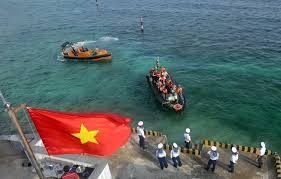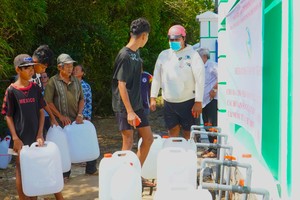
On the occasion, Dr. Le Thi Tuyet Mai, a member of the Executive Board of Vietnam Society of International Law, Chair of Vietnam Lawyers Association Branch at the Ministry of Foreign Affairs, Director General of Department of International Law and Treaties, wrote an article entitled “UNCLOS 1982: Overarching framework for establishing the legal order for the seas and oceans, promoting development and cooperation at sea.”
The following is the full text of the article.
“On June 23, 1994, the National Assembly of Vietnam adopted the Resolution ratifying the 1982 United Nations Convention on the Law of the Sea (UNCLOS)[2]. This year marks the 25th anniversary of the entry into force of UNCLOS and the ratification and deposit of the instrument of ratification by Vietnam with the Secretary-General of the United Nations. Vietnam participated in the UNCLOS negotiation and was among 107 states signing UNCLOS on December 10, 1982 when the Convention was open for signature. Its active participation to and implementation of UNCLOS shows Vietnam’s good faith, respect and hope for an equitable legal order for the seas and oceans. Article 2 of the above-mentioned Resolution of the National Assembly of Vietnam emphasizes: “By ratifying the 1982 United Nations Convention on the Law of the Sea, the Socialist Republic of Vietnam expresses our determination to coordinate with the international community to establish an equitable legal order for the seas and oceans and promote development and cooperation at sea”.
UNCLOS constitutes the overarching legal framework for the seas and oceans
As a multilateral treaty, UNCLOS is considered as the second most important legal instrument established after the World War II, only after the Charter of United Nations. It is universally ratified and/or accepted. The annual United Nations General Assembly Resolution on Oceans and Law of the sea affirms that “the Convention sets out the legal framework within which all activities in the oceans and seas must be carried out and is of strategic importance as the basis for national, regional and global action and cooperation in the marine sector, and that its integrity needs to be maintained.”
In the Preamble of UNCLOS, the State Parties affirms their “desire to settle … all issues relating to the law of the sea” and establish “a legal order for the seas and oceans”. Prompted by such desire, with 320 Articles and 9 Annexes, UNCLOS provides in a clear and comprehensive manner the legal status of all maritime zones under or beyond national jurisdiction, rights and obligations of every State including coastal, landlocked or geographically disadvantaged States in the use, exploitation and management of the seas and oceans and marine resources. UNCLOS also sets out principles and provisions on navigation and aviation; conservation and management of marine resources including living and non-living resources; protection and preservation of marine environment, marine scientific research, maritime security; dispute settlement and cooperation among State Parties.
The role of UNCLOS as the overarching universal legal framework is also affirmed in Articles 293 and 311 on the relation between UNCLOS and other sources of international law including conventions, international agreements and customary international law. States emphasized in UNCLOS that any agreements between two or more state parties of UNCLOS on the issues provided in UNCLOS must be compatible with UNCLOS; “the Convention shall not alter the rights and obligations of State Parties which arise from other agreement compatible with this Convention” (Article 311.2); agreement modifying or suspending the operation of provisions of this Convention may be concluded provided that such agreement do not affect “the effective execution of the object and purpose of this Convention”, “the application of the basic principles embodied herein” and “the enjoyment of other States Parties of their rights or the performance of their obligations under UNCLOS” (Article 311.3); agreement expressly permitted and preserved by other articles of this Convention are not affected (Article 311.5). Regarding the relations between UNCLOS and other sources of international law, such as customary law, only rights and obligations arising from rules of international law compatible with UNCLOS are recognized and applied by competent courts and arbitral tribunals under Part XV of UNCLOS (Article 293.1).
Paragraph 8 of the Preamble of UNCLOS, which states that “matters not regulated by this Convention continue to be governed by the rules and principles of general international law”, should be interpreted in a manner compatible with the objectives and provisions of UNCLOS as mentioned above. In fact, this paragraph provides for the relation between UNCLOS as lex specialis with specific provisions on the law of the seas and general international law (or lex generalis) with general principles and provisions for all branches of international law, such as principles of pacta sunt servanda, peaceful settlement of international disputes, provisions on interpretation of treaties embodied in the Vienna Convention on the Law of treaties 1969. Furthermore, the Preamble of UNCLOS affirms itself that UNCLOS settles all issues relating to the law of the sea. Therefore, such interpretation of this paragraph 8 that UNCLOS is not the only legal framework and there are other frameworks to regulate the use of seas and oceans such as customary law established before UNCLOS, is totally contrary to UNCLOS’s objectives and purposes and undermines the universally recognized values of UNCLOS.
In a recent case, an arbitral tribunal established under UNCLOS Annex VII considered the relation between UNCLOS and other sources of international law, especially the validity of any rights established before UNCLOS and concluded as follow: (i) UNCLOS does not affect the rights and obligations established independently to UNCLOS and not incompatible with the Convention; (ii) UNCLOS prevails the rights and obligation established independently to UNCLOS and incompatible with the Convention.[9] This arbitral tribunal also emphasized that no provision in UNCLOS allows historic rights of one State to resources in the exclusive economic zones, continental shelf of other States as well as high seas and the international seabed Area. UNCLOS also does not allow the preservation or protection of historic rights incompatible with UNCLOS.
UNCLOS clearly establishes legal regimes of maritime zones, rights and obligations of States
By codifying customary law, States agree upon and clearly stipulates in UNCLOS legal regimes of all maritime zones, setting the limits of the maritime zones under sovereignty, sovereign rights and jurisdiction of coastal States (i.e. internal waters, territorial sea and contiguous zone, exclusive economic zone and continental shelf); the maritime zones beyond national jurisdiction, including High seas and the international seabed Area (seabed and subsoil as well as mineral resources as common heritage of mankind). UNCLOS also provides rights and obligations of States Parties of different categories in these maritime zones. Core provisions of UNCLOS contain legal status of exclusive economic zones, continental shelf, regime of islands, artificial structures and cooperation for protection of marine environment, conservation and management of marine resources. Under the light of the provisions of UNCLOS on EEZ and continental shelf, all activities of exploring and exploiting natural resources in EEZ and continental shelf of a coastal State are subject to permit of the coastal State and those activities carried out without express consent of the coastal State are illegal, and constitute manifest violation of the provisions of UNCLOS.
The exclusive economic zone (EEZ) was first embodied in UNCLOS by the strong support of developing countries including Vietnam. UNCLOS provides that, within the EEZ of a coastal State, extending up to 200 nautical miles from the baselines from which the breadth of the territorial sea is measured (Article 57), the coastal State has sovereign rights to the natural resources of the waters superjacent to the sea-bed and of the sea-bed and its subsoil; sovereign rights to the economic exploitation and exploration of the zone; jurisdiction to marine scientific research and protection and preservation of the marine environment (Article 56). Other States, whether coastal or landlocked, enjoy the freedom of navigation and over flight and the laying of submarine cables and pipelines (Article 58). Landlocked or geographically disadvantaged States shall have the right to participate, on an equitable basis, in the exploitation of an appropriate part of the surplus of the living resources of the EEZ of coastal States of the same sub-region or region (Articles 69 and 70); living resources, including migratory species, are subject to conservation and development in conformity with the provisions of UNCLOS (Articles 61 - 73). UNCLOS also clearly provides that other States, in exercising their rights and performing their duties in the EEZ, shall have due regard to the rights and duties of the coastal State and shall comply with the laws and regulations adopted by the coastal States as well as other rules of international law (Article 58).
The continental shelf of a coastal State comprises the seabed and subsoil of the submarine areas that beyond its territorial sea throughout the natural prolongation of its land territory. In reality, the outer edge of continental shelf differs among regions, some may not extend to 200 nautical miles but some may extend beyond such limits. Under Article 76 of UNCLOS, the continental shelf of a coastal state may extend to at least 200 nautical miles from the baselines; wherever the continental margin extends beyond 200 nautical miles from the baselines, the coastal State has the right to establish the outer limit of its continental shelf, by either, not exceed 350 nautical miles from the baselines or not exceed 100 nautical miles from the 2500 meters isobaths. However, in order to extend the limits of the continental shelf beyond 200 nautical miles, coastal States are obliged to submit to the Commission on the Limits of Continental Shelf with full geodetic data; then the Commission will consider and make recommendations to coastal States. In its continental shelf, the coastal State has sovereign rights for the purpose of exploring it and exploiting its natural resources (Article 77.1). It should be noted that such sovereign rights are exclusive in the sense that no other countries may explore and exploit the natural resources in its continental shelf without express consent of the coastal State (Article 77.2); coastal State enjoys exclusive rights to authorize and regulate drilling on the continental shelf for all purposes (Article 81). The exercise of rights of the coastal State over the continental shelf must not infringe the freedom of navigation and other freedoms under UNCLOS.
Regarding legal regime of islands, Article 121 of UNCLOS sets criteria to determine whether a geographical feature is an “island” or a “rock”. Accordingly, an island is a naturally formed area of land, surrounded by water, which is above water at high tide; an island can sustain human habitation or economic life of their own shall have its own territorial sea, contiguous zones, exclusive economic zone or continental shelf applicable to other land territory. Rocks which do not meet the two above-mentioned criteria shall have 12 nautical miles-territorial sea only, no exclusive economic zone or continental shelf. Low-tide elevations have no territorial sea of their own (and no exclusive economic zone and continental shelf); they do not affect the limit of maritime zones (Article 13.2).
According to a recent award of an Arbitral Tribunal under Annex VII of UNCLOS, “rock which cannot sustain human habitation or economic life of their own shall have no exclusive economic zone and continental shelf” as the legal regime of islands in Article 121 UNCLOS depends on the objective capability of the feature in their natural characteristics to sustain human habitation or economic life of their own without external sources or only with exploiting objectives. The Tribunal also concluded that none of geographical features in the Spratly Islands are capable of creating EEZ or continental shelf; islands in the Spratly Islands cannot create maritime zones as a whole. The high-tide features create territorial sea while low-tide elevations do not.
Artificial structures cannot be considered as islands since they are not naturally formed area of land. UNCLOS clearly regulates the construction of artificial structures. In particular, the coastal State, in the EEZ, shall have the exclusive right to construct and to authorize and regulate the construction, operation and use of artificial islands, installations and structures, of which their presence does not affect the delimitation of the territorial sea, the exclusive economic zone or the continental shelf (Article 60.8). Moreover, due notice must be given of their construction and permanent means for giving warning of their presence must be maintained; any installations or structure which are abandoned shall be removed to ensure safety of navigation, considering any generally accepted international standards established in this regard by the competent international organization (Article 60.3).
UNCLOS also requires States to cooperate in protection of marine environment and conservation and management of natural resources in coastal States’ maritime zones as well as high seas (Part XII). UNCLOS provides that States bordering an enclosed or semi-enclosed sea should cooperate to manage living resources, adopt scientific research and marine environment policies and undertake relevant activities. Landlocked States enjoy the rights to access the sea and transit through transit waters. States Parties shall prevent and control marine pollution and be liable for damages resulted from the responding violations. Marine scientific research are subject to the rights and duties of other States as provided for in this Convention.
It should be emphasized that every maritime area has its own legal regime as stipulated in UNCLOS, including rights and obligations of coastal States and other different categories of States. Coastal States, on the one hand, enjoy the rights in their maritime zones, and, on the other hand, have the obligation to respect rights of other States and perform other obligations under UNCLOS.
UNCLOS establishes institutions, mechanisms to ensure its implementation, including mechanism for settlement of disputes concerning interpretation and application of the Convention
To ensure full and consistent implementation of the Convention in practice, UNCLOS establishes a set of bodies and mechanisms with different roles and functions which supplement each other. Specialized organizations established under UNCLOS include: (i) the International Seabed Authority (ISA, designated to organize and control the exploration and mining of the mineral resources in the Area – common heritage of mankind and administer a benefit-sharing mechanism); (ii) the Commission on the Limits of the Continental Shelf (CLCS, whose functions are to consider the submissions of coastal States and make recommendations regarding the establishment of outer limits of the continental shelf beyond 200 nautical miles); (iii) the International Tribunal on the Law of the Sea (ITLOS, a judicial body having the mandate to adjudicate disputes between States arising out of the interpretation and application of the Convention). In addition, the annual Meeting of the States Parties to UNCLOS (SPLOS) is convened in accordance with the Convention to consider the reports of organizations established under the Convention; make decisions on budgetary matters and working conditions of those organizations as well as discuss any issues arising from the implementation of the Convention.
UNCLOS also provides for mechanisms for settlement of disputes among States with respect to the interpretation and application of the Convention (Part XV). Such mechanisms have been used by states quite often in practice. It is worth noting that the dispute settlement mechanisms under UNCLOS are only applicable to settlement of disputes between States concerning the interpretation and application of the Convention (Articles 279 and 288) and constitute peaceful means for dispute settlement under international law as clearly endorsed in the United Nations Charter, including diplomatic and legal processes.
Accordingly, when a dispute arises with respect to the interpretation and application of UNCLOS, State Parties concerned are obliged to carry out exchange of views regarding dispute settlement through negotiation or other peaceful means (Article 283).
If the exchange of views or negotiation in a reasonable period do not result in a settlement agreement, the parties may agree to submit the dispute to international judicial bodies for a binding decision, including the International Court of Justice (ICJ), the International Tribunal on the Law of the Sea (ITLOS - established under Annex VI of UNCLOS), an arbitral tribunal (constituted in accordance with Annex VII of UNCLOS) or a special arbitral tribunal (constituted in accordance with Annex VIII of UNCLOS). States, at any time, can make declarations choosing one or more of those aforementioned procedures.
In order to resort to the compulsory procedures under UNCLOS, the parties to a dispute must satisfy the requirement that the parties have already carried out exchange of views, as previously mentioned, and have not reached an agreement on dispute settlement through another compulsory procedure entailing a binding decision and that agreement does not exclude dispute settlement procedures under UNCLOS (Article 282). The Convention also has clear provisions to ensure that, other than certain exceptions under Article 298, in case where the parties to a dispute which have not made declarations choosing a procedure or not accepted the same procedure or otherwise not agreed on means of dispute settlement, such dispute shall be submitted to a compulsory procedure – arbitral tribunal to be established in accordance with Annex VII of UNCLOS. In fact, such arbitration procedure has been used by many States. Although there are cases in which a party to a dispute makes certain objections and there are certain exceptions, in the event of disagreement over the jurisdiction of the arbitral tribunal, the tribunal itself has the competence to make a decision on whether it has jurisdiction over the dispute (Article 288); the decision of the arbitral tribunal is final and binding upon all parties to the dispute, even if a party to such dispute did not participate in the procedure (Article 296).
Besides, UNCLOS also provides for a compulsory conciliation procedure. Accordingly, even if a party to a dispute makes a declaration excluding a compulsory dispute settlement procedure with regard to certain types of disputes, and such dispute arises after the entry into force of UNCLOS and both parties could not reach an agreement through negotiation in a reasonable period, either party to the dispute may choose to submit the dispute to a Conciliation Commission (established in accordance with Annex V of UNCLOS). Although the conclusions and recommendations of the Conciliation Commission don’t have binding effect, parties to the dispute are obliged to negotiate on the basis of the report and recommendations in order to reach a resolution of the dispute. Timor Leste, after a period of fruitless negotiation with Australia, had resorted to the Conciliation Commission under Annex V of UNCLOS to seek a resolution for its long-standing dispute with Australia over maritime delimitation and marine resources sharing.[11] This marks the first time the compulsory conciliation procedure has been successfully applied. On the basis of the Report and recommendations of the Conciliation Commission, Timor Leste and Australia had negotiated and reached a Treaty on maritime boundary delimitation in March 2018, binding on both countries and eventually settling the dispute between these two countries.
It has been practically proved that decisions rendered by judicial bodies set forth under UNCLOS, especially ITLOS or arbitral tribunals, constituted significant contributions to the interpretation of the provisions of UNCLOS and clarification of controversial and ambiguous issues or any claims or activities contrary to the UNCLOS. It should be noted that effective implementation of UNCLOS by its State parties, like other international treaties, is not only reflected in their positions at global and regional forums relating to seas and oceans, but in fact depends on actions of State parties in using seas and oceans as well as marine resources and requires good faith and due regards of every State party.
UNCLOS is the legal framework for promoting cooperation in response to maritime challenges, for the preservation and sustainable use of seas and oceans and marine resources
Coastal states have established their respective maritime zones in accordance with UNCLOS, enacted domestic legislations on seas, engaged in various programs and activities of cooperation on ocean management such as through bilateral, regional, sub-regional and global cooperation mechanisms, such as regional sea commissions, regional fishery organizations, marine environment protection mechanism, or implementing area-based marine protection projects. Such practices have vividly depicted at many levels the effort and willingness of almost all countries and international organizations in the implementation of UNCLOS.
Many international organizations, with the UN and UN Oceans system at the forefront, have actively promoted the implementation of UNCLOS in every aspects, including encouraging those states that are not yet parties to UNCLOS to ratify or accede to UNCLOS; providing capacity-building assistance for least-developed and developing countries to better fulfill their obligations under the Convention and providing financial supports through Trust Funds for these countries to participate in forums on seas and oceans within the framework of UNCLOS and United Nations General Assembly (UNGA). Moreover, the UN Secretary-General prepares and submits annual reports on emerging issues on implementing UNCLOS to the UNGA, SPLOS and related international organizations, providing a basis for countries to discuss and review the implementation of the Convention in general. The UN also maintains an Open-ended Informal Consultative Process (ICP) to discuss emerging issues on ocean management and make recommendations on necessary measures and issues which should be codified within the framework of UNCLOS to better manage seas and oceans.
As a result of discussions and recommendations of ICP, after a long and informal discussion at the UN since 2004, the UNGA decided to convene an Intergovernmental Conference on an international legally binding instrument under UNCLOS on the conservation and sustainable use of marine biological diversity of areas beyond national jurisdiction (BBNJ), which held the first session in Oct. 2018 and second session in April 2019. When adopted, this legal instrument is expected to be a significant addition to the existing legal framework on seas and oceans set by UNCLOS, for the sustainable use and conservation of common resources of mankind for present and future generations.
UNCLOS continues to serve as the legal framework for countries to address traditional challenges such as maritime delimitations and disputes, piracy, cross-border criminals, as well as emerging challenges including marine pollution, running out of resources, marine plastic debris, climate change, sea level rise, sustainable development of ocean economy (blue economy) towards achieving the goal of conservation and sustainable use of seas and oceans and their resources, in accordance with Sustainable Development Goal 14 (SDG14) under the UN 2030 Agenda.
All maritime disputes must be settled by peaceful means in accordance with international law including UNCLOS
In certain regions still exist maritime disputes such as disputes over the delimitation of overlapping maritime entitlements, identification of regime of geographical features in the seas or the exploitation and sharing of marine resources, in particular mineral resources. Such disputes are inevitable because UNCLOS authorizes coastal states to establish broad maritime zones under national jurisdiction, leading to the existence of overlapping maritime areas claimed by opposite or adjacent coastal states. This situation is rooted in the significant role of seas and oceans and marine resources for the development of states. It is an undeniable fact that some maritime disputes arise from absurd claims made by related coastal states totally contrary to UNCLOS.
Facing maritime disputes in many areas around the globe, the international community agrees that all states must fully respect and implement UNCLOS, clarify their maritime claims and settle all disputes by peaceful means in accordance with international law including UNCLOS, and thus reaching appropriate resolution of disputes between parties concerned, or at least provisional measures and at the same time making efforts towards an equitable settlement solution, ensuring legal rights and legitimate interests parties concerned.
In the context of complicated developments in the East Sea (South China Sea), states concerned must respect the legal order for the seas and oceans established under UNCLOS, respect diplomatic and legal processes including on-going negotiations, refrain themselves from taking actions which undermine the role of UNCLOS in order to ensure peace, security, safety and freedom of navigation in the region and the world at large, for the common benefit of the region and international community. Maritime claims by states must be clarified in accordance with the provisions of UNCLOS. In case of disputes or differences regarding the interpretation and application of UNCLOS, parties concerned are obliged to resolve such disputes by peaceful means, in accordance with international law, including UNCLOS. Pending the disputes resolution, parties concerned must fully respect and comply with the Declaration on the Conduct of Parties in the South China Sea of 2002 (DOC), refrain from undertaking unilateral activities which could complicate the situation and escalate the disputes. Parties concerned should also participate constructively in the negotiations toward an effective and substantive COC in conformity with international law, including UNCLOS.
Being a coastal State and Party to UNCLOS, Vietnam has been making its utmost efforts for peaceful resolution of maritime issues in the East Sea in accordance with international law, including UNCLOS. Furthermore, Vietnam has also been fully implementing UNCLOS since Vietnam accepted to be bound by UNCLOS and becoming a State Party to UNCLOS 25 years ago. Together with other State Parties, Vietnam will continue to promote full respect for and implementation of UNCLOS with a view to protecting the legal values of this universal legal framework.
























